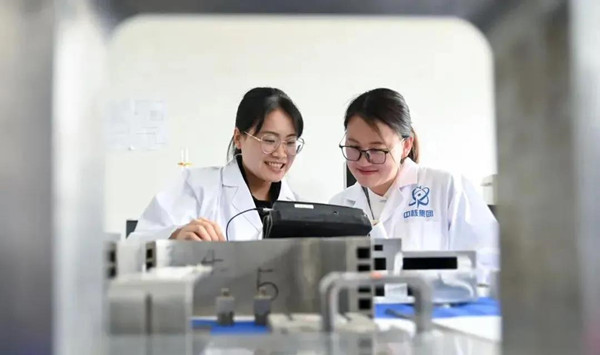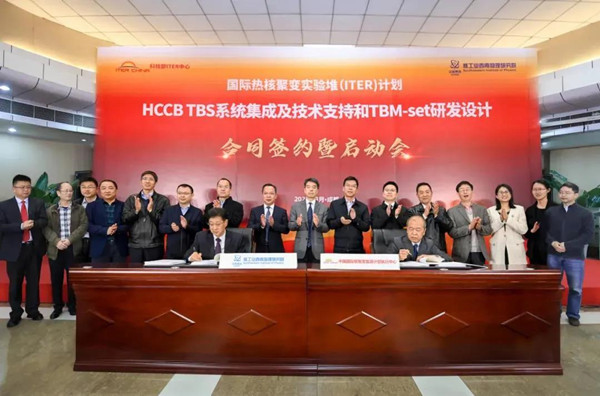Tritium breeding test blanket project for ITER launched at CNNC
On March 15, the first project of the Chinese Helium Cooled Ceramic Breeder Test Blanket System (HCCB TBS) for ITER (International Thermonuclear Experimental Reactor) was launched at the China National Nuclear Corporation (CNNC) Southwestern Institute of Physics in Chengdu, Southwest China's Sichuan province. It marked the moment that China entered the implementation phase of Tritium breeding technology in ITER, and means that human beings are a step closer towards achieving the dream of clean fusion energy.

A Tritium breeding blanket is a core component for future fusion reactors to realize Tritium breeding self-sufficiency and electricity generation. Tritium-breeding technology is one of the key technological problems facing future fusion reactors, so there is a pressing need for it to be solved. The ITER Test Blanket Modules (TBMs) program aims to carry out tritium breeding blanket technology verification in the real fusion reactor environment provided by ITER, which is one of ITER's three major engineering goals. The HCCB TBS system is a vital part of China's participation in the ITER program, as well as a key link for the country to independently master Tritium breeding blanket technology and develop future commercial fusion reactors.
The CNNC Southwestern Institute of Physics has led the completion of the preliminary pre-development and design of the system, and officially taken over the engineering design and system R&D and testing tasks assigned by the country.
Organized by the China International Nuclear Fusion Energy Program Execution Center (ITER China Domestic Agency) with the support of the Ministry of Science and Technology of China, the CNNC Southwestern Institute of Physics, in collaboration with all other participants, has overcome various manufacturing difficulties throughout more than a decade's design and R&D process; verified through internationally advanced technology the feasibility of the ITER test blanket system proposed by China; and cultivated an innovative research team with international vision. Meanwhile, in order to ensure the smooth start and implementation of the project, the CNNC Southwestern Institute of Physics has established a nuclear safety and quality guarantee system that meets the requirements of ITER, and has formulated a detailed implementation plan.

The signing of the contract and the successful delivery of the launch will further advance the design and development of the project's system integration and test blankets, laying a solid foundation for future manufacturing and delivery, as well as testing and operation in ITER.
Since it joined the ITER project in 2003, China has actively participated in the ITER test blanket program. It proposed and developed the concept of HCCB TBS, and attempted to test it in ITER. In 2014, Luo Delong, director of ITER China Domestic Agency, signed an HCCB TBS contract with the ITER organization on behalf of China, promising that China will independently design and manufacture HCCB TBS and conduct experimental tests in ITER.
After years of hard work, China has achieved breakthroughs in the design, development and component testing of the system, reaching an internationally advanced level. The work China has done in the preliminary design phase is also at the forefront of all other participants in the ITER test blanket program.
The launch was attended by Luo Delong, and representatives from the Science and Technology Department of Sichuan province, the CNNC Technology Quality and Information Technology Department, the CNNC Southwestern Institute of Physics and other relevant departments.
- China Institute of Atomic Energy
- Nuclear Power Institute of China
- Southwestern Institute of Physics
- China Nuclear Power Operation Technology Corporation, Ltd.
- China Nuclear Power Engineering Co., Ltd.
- China Institute for Radiation Protection
- Beijing Research Institute of Uranium Geology (BRIUG)
- China Institute of Nuclear Industry Strategy (CINIS)
- China Nuclear Mining Science and Technology Corporation


